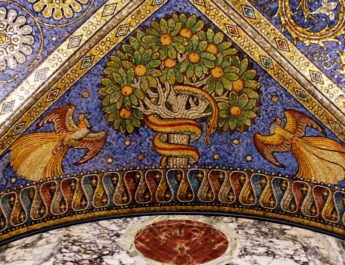Romans 5:1-8
Ordinary A29
1 Therefore, since we are justifiedA by faith,B we have peaceC with GodD through our LordE JesusF Christ,G
A “justified” = dikaioo. From dikaios (correct, righteous – implies innocent; this is that which conforms to God’s notion of justice, uprightness); from dike (the principle of justice; that which is right in a way that is very clear; a decision or the execution of that decision; originally, this word was for custom or usage; evolved to include the process of law, judicial hearing, execution of sentence, penalty, and even vengeance; more commonly, it refers to what is right); may be from deiknumi (to show, point out, exhibit; figurative for teach, demonstrate, make known). This is to be righteous, plead the cause of, justify, acquit. Properly, it is being approved, particularly carrying the weight of a legal judgment. It is upright, render just, or innocent.
B “faith” = pistis. From peitho (to have confidence, urge, be persuaded, agree, assure, believe, have confidence, trust). This is less about knowing, believing, and repeating a list of doctrines then it is about trusting God. Faith means listening to God and seeking to live a holy life even (and especially) when we don’t understand how everything works or fits together. Faith is about being faithful (trusting and doing) rather than being all knowing.
C “peace” = eirene. Perhaps from eiro (to join, tie together to form a whole). This is one, peace, quietness, rest, peace of mind, harmony. Peace was a common farewell among Jews (i.e. shalom) and this well-wishing included a blessing of health and wholeness for the individual. This word also indicates wholeness and well-being – when everything that is essential is joined together properly. This is peace literally or figuratively. By implication, it is prosperity (but not in the sense of excessive wealth. Prosperity would have meant having enough from day to day.)
D “God” = theos. From Proto-Indo-European origins, meaning do, put, place. This is God or a god in general.
E “Lord” = kurios. From kuros (authority, supremacy). This is a respectful address meaning master or sir. It refers to one who has control or power greater than one’s own. So, it was also applied to God and Jesus as Master or Lord.
F “Jesus” = iesous. From Hebrew Yehoshua (Joshua, the Lord is salvation); from YHVH (proper name of the God of Israel; the self-existent and eternal one); from havah (to become) or from hayah (to come to pass, become, be) + yasha (to deliver, defend, help, preserve, rescue; properly, to be open, wide or free, which implies being safe. So, in a causative sense, this is to free someone). This is Jesus or Joshua in Greek – the Lord saves or the Lord is salvation.
G “Christ” = christos. From chrio (consecrate by anointing with oil; often done for prophets, priests, or kings). Literally, the anointed one, Christ. The Greek word for Messiah.
2 through whom we have obtained accessH, I to this graceJ in which we stand; and we boastK in our hopeL of sharing the gloryM of God.
H “access” = prosagoge. 3x in NT. From prosago (to bring near, come to, approach); {from pros (at, toward, with) + ago (lead, bring, carry, guide, go, drive)}. This is approach, access, introduction, admission. Generally refers to face to face interaction.
I {untranslated} = ho + pistis. Literally “by faith.”
J “grace” = charis. From chairo (to rejoice, be glad; used to say hello; properly, delighting in the grace of God or experiencing God’s favor); from char– (to extend favor, lean towards, be inclined to be favorable towards). This is grace, kindness, favor, gratitude, thanks. It is the sense of being inclined to or favorable towards – leaning towards someone to share some good or benefit. This can be literal, figurative, or spiritual. It is grace as abstract concept, manner, or action.
K “boast” = kauchaomai. Perhaps from auxen (neck). This is literally holding one’s head high – to boast proudly or to glory, joy, exult, rejoice. It can be boasting in a positive or negative sense.
L “hope” = elpis. From elpo (to anticipate, welcome, expect; usually to anticipate positively). This is expectation, hope, trust, confidence faith. The expectation can be abstract or concrete.
M “glory” = doxa. From dokeo (to have an opinion, seem, appear, suppose; a personal judgment; to think); from dokos (opinion). This is literally something that evokes a good opinion – something that connects to our understanding of intrinsic worth. The ultimate expression of this is, of course, God and God’s manifestation. So, this is opinion, honor, and dignity, but also praise, glory, renown, and worship.
3 And not only that, but we also boast in our sufferings,N knowing that suffering producesO endurance,P 4 and endurance produces character,Q and character produces hope,
N “sufferings” = thlipsis. From thlibo (to press in on and make narrow, rub together, constrict; figuratively to oppress or afflict). This is pressure that hems us in – used often of internal pressure that makes us feel like we have no other options and are confined or restricted. So, this is persecution, affliction, trouble, distress, and anguish. There is a different word, stenoxoria, that refers to external pressure that we feel from what’s going on.
O “produces” = katergazomai. From kata (down, against, throughout, among, daily) + ergazomai (to work, labor); {from ergon (word, task, action, employment)}. This is working something until it is completed, working fully, accomplishing, producing, achieving, performing.
P “endurance” = hupomone. From hupo (by, under, about) + meno (to stay, remain, wait, await, continue, abide). This is properly to remain behind or remain under. It implies endurance, patience, steadfastness, and waiting in hope.
Q “character” = dokima. Perhaps related to “glory” in v2. 8x in NT. From dokimos (tested, acceptable, approved; something that has passed scrutiny and so is accepted because it is seen as genuine); from dechomai (to warmly receive, be ready for what is offered, take, accept, or welcome; to receive in a literal or figurative sense) OR from dokimos (see above); from dokeo (see note M above).This is trial, test, ordeal, or proof. By implication, it is proven worth or a character that has passed the test. It also implies genuineness and trustworthiness.
5 and hope does not disappointR us, because God’s loveS has been pouredT into our heartsU through the HolyV SpiritW that has been given to us.
R “disappoint” = kataischuno. 13x in NT. From kata (down, against, according to, among) + aischunomai (to dishonor, put to shame, shrink, disfigure) [from aischos (shame, disgrace, disfigurement)]. This is literally to shame down, which is to say disgrace or implying make someone blush. It can be frustrate, dishonor, confound or shame.
S “love” = agape. This is love, goodwill, benevolence. It is God’s divine love.
T “poured” = ekcheo. From ek (from, from out of) + cheo (to pour). This is something poured out in a liberal fashion. So, it is gushing, spilling, or shedding.
U “hearts” = kardia. Literally the heart, but figuratively mind, character, inner self, will, intention, thoughts, feelings. Also, the center of something. The word heart is only used figuratively in the Old and New Testaments. This is where “cardiac” comes from.
V “Holy” = hagios. From hagnos (holy, sacred, pure ethically, ritually, or ceremonially; prepared for worship, chaste, unadulterated, pure to the core; undefiled by sin; figurative for innocent, modest, perfect). God is totally different from humanity and thus set apart. That which is consecrated to worship God (elements of worship) or to serve God (as the saints) are holy because they are now set apart for God’s purposes. Holy because important to God. This is sacred physically, pure. It can be morally blameless or ceremonially consecrated.
W “Spirit” = pneuma. From pneo (to blow, breath, breathe hard). This is wind, breath, or ghost. A breeze or a blast or air, a breath. Figuratively used for a spirit, the human soul or part of us that is rational. It is also used supernaturally for angels, demons, God, and the Holy Spirit. This is where pneumonia comes from.
6 For while we were still weak,X at the right timeY Christ died for the ungodly.Z 7 Indeed, rarelyAA will anyone die for a righteous personBB —though perhaps for a good personCC someone might actually dareDD to die.
X “weak” = asthenes. From a (not) + sthenes (strong, vigor) [from the base of sthenoo (to strengthen so that one can be mobile); from sthenos (strength)]. This is without strength so weak, sick, helpless, frail, feeble. It can also be unimpressive or impotent. It can be used for physical or moral weakness.
Y “right time” = kairos. This is season, opportunity, occasion. The word chronos is used for chronological time. Kairos is used for spiritually significant time – the right time or appointed time.
Z “ungodly” = asebes. 9x in NT. From a (not) + sebo (to worship, revere, adore, be devout; properly this is personally placing a high value on someone or something, showing respect). Properly, this is being irreverent, not acting with appropriate respect or declining to show honor to the sacred. So, it could be ungodly, impious, wicked, or irreverent.
AA “rarely” = molis. 6x in NT. From mogos (laborious toil) OR from molos (toil) OR from mogis (scarcely, barely; something that only happens with difficulty; emphasizes that the action is prolonged and therefore difficult). This is something that hardly happens and/or requires a lot of effort.
BB “righteous person” = dikaios. Related to “justified” in v1. From dike (see note A above). This is correct, righteous, just, or a righteous person. It implies innocent or conforming to God’s standard of justice.
CC “good person” = agathos. This is good, a benefit, or a good thing. It is good by its very nature, intrinsically good. A different word, kalos, refers to external signs of goodness.
DD “dare” = tolmao. 16x in NT. From tolma (boldness); perhaps from telos (an end, aim, purpose, completion, end goal, consummation, tax); from tello (to start out with a definite goal in mind). This is to show courage to take a risk, to venture decisively, to put it on the line for something that matters.
8 But God provesEE his love for us in that while we still were sinnersFF Christ died for us.
EE “proves” = sunistemi. Related to “stand” in v2. 16x in NT. From sun (with, together with, closely associated) + histemi (to stand, place, set up, establish, stand ready, stand firm, be steadfast). This is to establish, place together, prove, exhibit, demonstrate, commend, or approve. It can be standing together in the sense that the facts all line up to support a point or commend it. It can be set together in the sense of presenting or introducing something in a positive light.
FF “sinners” = hamartolos. From hamartano (to miss the mark, do wrong, make a mistake, sin). Hamartano is from a (not) + meros (a part or share). This is sinning, sinful, sinner. It referred to missing the mark or falling short. The term was also used in archery for missing the target.
Image Credit: “Hallelujah” by Mike Moyers, 2013.




